Pelosi Says Putin-Khamenei Ties Are Tyrant-To-Tyrant Friendship
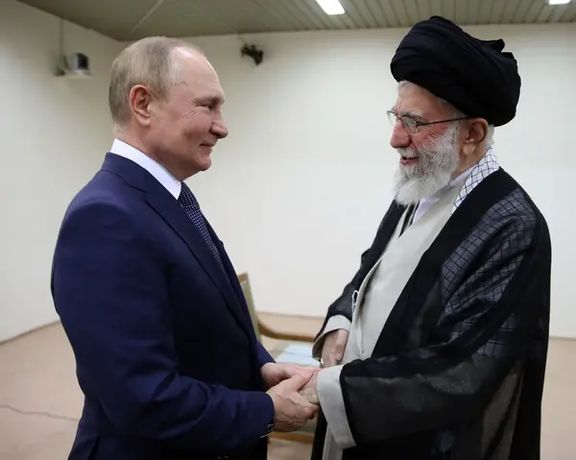
Iranian Supreme Leader’s endorsement of the Russian invasion of Ukraine is not surprising, Speaker of the US House of Representative Nancy Pelosi said Thursday.

Iranian Supreme Leader’s endorsement of the Russian invasion of Ukraine is not surprising, Speaker of the US House of Representative Nancy Pelosi said Thursday.
Asked by Iran International correspondent Arash Aalaei about Islamic Republic’s ruler, Ali Khamenei praising Vladimir Putin’s “initiative” to invade Ukraine, Pelosi said, “Tyrants find their friends and there’s no surprise in any of that. I don’t think anybody has ever recognized Khamenei as a respecter of boundaries or people.”
During Putin’s trip to Tehran July 19, Khamenei lauded the Russian leader’s initiative in attacking Ukraine, saying that NATO would have launched a war sooner or later in Ukraine.
Pelosi added, “To me what Khamenei said was practically irrelevant, but what is relevant is the weapons he may supply Russia with.”
The United States has warned that Russia is preparing to receive Iranian military drones to use in Ukraine and has even sent teams to Iran to review its options. Iran has half-heartedly denied the accusation, but Khamenei’s strong endorsement of the invasion is a signal that Tehran would have little hesitation in supplying the drones.
Pelosi sounded resigned that Iran will cooperate with Russia. “It’s tyrant-to tyrant; doesn’t matter what any of us think; it’s what they will do,” she said.

Israel’s Mossad captured a senior IRGC official on Iranian soil and interrogated him about weapons shipments to Iran's proxies, Iran international has learned.
Iran International has obtained video footage of the interrogation in which a man introducing himself as Yadollah Khedmati, deputy commander of the Revolutionary Guards (IRGC) Logistics, says he regrets his involvement in shipping weapons to Iran’s proxy groups in Syria, Iraq, Lebanon, and Yemen and urges other IRGC officials to avoid engagement in such activities.
According to a source, Khedmati served as the deputy of Brigadier General Ali Asghar Nowrouzi, the IRGC’s Logistics commander who is known as a close associate of the former commander of the IRGC’s Qods Force, Ghasem Soleimani. Soleimani was assassinated by the US in Baghdad in January 2020.
Khedmati also tells his interrogators about Nowrouzi’s connections with Fars Air Qeshm cargo airline. The airline has been accused of transporting weapons for Hezbollah during the civil war in Syria.
The source who spoke to Iran International on condition of anonymity said Mossad agents had released Khedmati unharmed after the several-hour-long interrogation at an unspecified time and place.
Nowrouzi has been responsible for sending weapons to Iran’s proxy groups in the region including Syria as well as securing funds for the operations of the Qods Force through the IRGC’s Cooperatives Foundation of which he's a board member, the source claimed.
On June 14th Iran’s state-run television (IRIB) in a report showed several men in prison outfits claiming they were recruited by a Mossad agent who went by the alias Sirous to abduct Iranian officials and carry out assassinations on Iranian soil on behalf of the Mossad.
The report called these individuals “thugs and hooligans” and claimed they were involved in a wide range of criminal activities including human and weapons trafficking before being recruited by Israeli agents.
Sirous, the men said, contacted them through social media, prepared them for their future mission which ranged from arson to murdering humans, in online group sessions, and paid them in US dollars.
According to the Iranian TV report, the recruited “thugs and hooligans” abducted “a Jihadi official linked to the IRGC” and took him to a mud hut in a field in an unknown location in the suburbs of Tehran where they forced him “to make false confessions” on camera under threat and torture about things “not related to his specialized field of work”.
The report said the Mossad agent behind the abduction was also arrested by the IRGC's intelligence (SAS) with the help of the intelligence ministry.
This is the second time evidence emerges of Israeli agents detaining an IRGC operative inside Iran and taping confessions. A short audio recording was published by Israeli media in May with a photo of a man introduced as Iranian national Mansour Rasouli, 52. In the audio recording, Rasouli said he was sent to Turkey by the IRGC to establish an operational network to assassinate an Israeli diplomat in Istanbul, a Germany-based US general, and a journalist in France.
Israeli television channels including Channel 12 which broadcast the recording, without providing a source according to The Times of Israel, claimed the video was made by Mossad operatives posing as Iranian secret service at Rasouli's home in Tehran. Channel 12 news added, also without citing a source, that the Shin Bet security agency — which generally operates within Israel — also participated in the detention in Iran.
Iranian, Israeli, and Turkish officials never made any comments about the reports of the alleged assassination plots but a week after the original audio recording emerged, the man in the photo published by Israeli media released a denial video on social media, possibly recorded and released by Iranian intelligence, in which he said he had been coerced by his abductors to make false confessions.
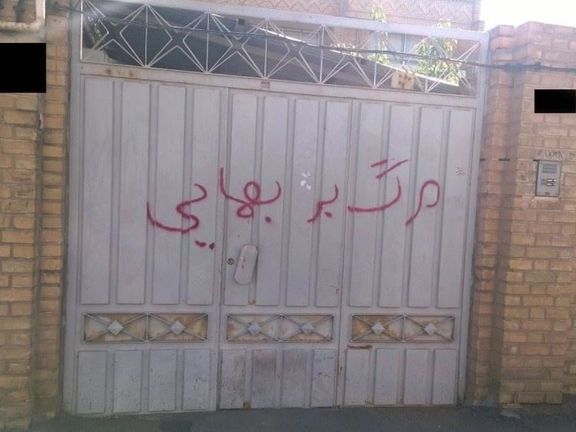
Followers of the Baha'i faith say the Islamic Republic has either arrested, summoned to court, put on trial or closed businesses of at least 20 Baha'i citizens just since the beginning of July.
The Worldwide Baha’i Community said in a statement published on July 20 that Tehran has intensified its systematic campaign to suppress the religious minority in recent weeks. The persecuted Baha’is in July were citizens of Shiraz, Tehran, Yazd and Bojnurd, it said.
According to the community, at least 44 Baha'is were detained, summoned to court, put on trial or given prison sentences, or had their homes searched in June.
Earlier in June, Radio Farda reported that 26 followers of the Baha'i faith, all of whom residing in the city of Shiraz in the southwestern province of Fars, were sentenced to 2-5 year in prison on charges of "conspiracy to disrupt internal and external security."
The 1979 constitution of the Islamic Republic recognizes only Islam, Christianity, Judaism and Zoroastrianism. Baha'ism, established as a new religion in Iran in 1863 by Baha'ullah, has always been deemed heretical by the Shia establishment and subject to intermittent bouts of political persecution.
Supreme Leader Ali Khamenei has on several occasions called the Baha'i faith a cult and in a religious fatwa in 2018 forbade contact, including business dealings, with followers of the faith.
Baha'is, who number around 300,000 in Iran, say their rights are systematically violated and they are often harassed, forced to leave their homes and businesses, and are deprived of government jobs and university education.
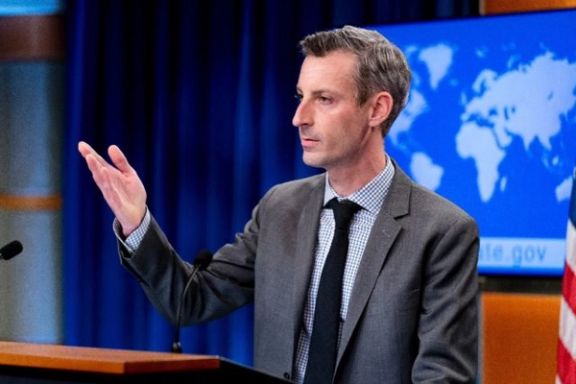
The US says Iran has abandoned the hollow veil of neutrality vis-à-vis the Russian invasion of Ukraine and openly supports President Vladimir Putin in his war against the Ukrainians.
State Department Spokesperson Ned Price said on Wednesday that “it was... striking to hear the supreme leader, in really no uncertain terms, essentially endorsing President Putin’s brutal invasion of Ukraine.”
He said, “It was especially striking because Iran all this time had attempted to maintain a veil of neutrality," pretending to be opposed to the war. “It’s now clear that was entirely hollow.”
Price also said that Russia having to seek out UAV technology from Iran means that it does not have the indigenous ability to produce it because of the export controls and other measures that the US imposed, which indicates its isolation. “The fact that President Putin would need to run into the arms of one of the most heavily sanctioned, one of the most isolated countries in the world, I think, speaks to the dire straits Moscow currently finds itself in.”
Iran has a choice. It can continue to opt for a position of relative dependency on a country like Russia, or it can choose the path of diplomacy, and specifically it can choose to take up the deal that’s been on the table for some time now, to have an economic relationship with other countries around the world, Price said.
Earlier on Wednesday, US defense officials as well as the head of US Central Intelligence Agency warned Iran against providing military drones to Russia.
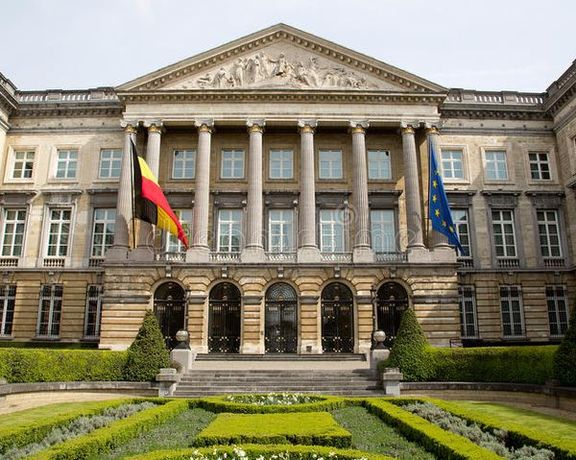
The Belgian Parliament has ratified a controversial prisoner swap treaty with Iran, which facilitates repatriating an Iranian diplomat sentenced to 20 years in jail on a terrorism conviction.
Following several postponements of the vote and a heated debate Wednesday, out of the 131 lawmakers present, 79 voted in favor while 41 rejected the treaty, and 11 abstained just after midnight.
Critics fear that the treaty, which would permit Iranians convicted in Belgium to serve their sentences in Iran and vice versa, will pave the way for the release of Assadollah Assadi, a terrorist convicted for his role in a plot to bomb a gathering of Albania-based opposition group, Mujahedin-e Khalq Organization (MEK) organization in Paris four years ago.
Several Belgian lawmakers shared concerns about why the treaty was rushed through parliament before the summer break, and said they were not able to consult enough external experts ahead of the vote.
Samuel Cogolati, a Green MP, said, “We had to be able to publicly express our reservations and deep concerns, and at the same time do our job as parliamentarians. We tried as much as possible to consolidate, to give guarantees for the rule of law, while ensuring the release of our Belgian compatriot in Iran.”
Meanwhile, Tehran has been holding Belgian humanitarian worker, Olivier Vandecasteele, in jail since February as leverage.
Belgium’s Justice Minister Vincent Van Quickenborne said on July the 6 that the assessment of the Belgian security service was that the failure to pass the bill would increase security threats.
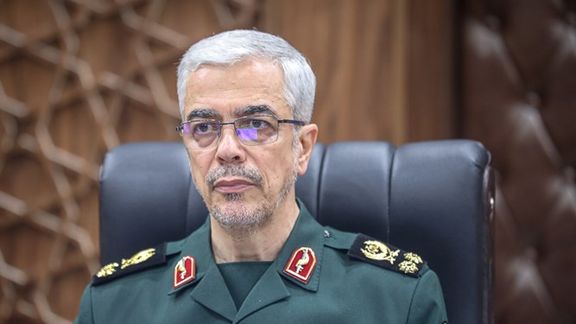
China is a strong power and Russia has ended its decline, weakening “American hegemony”, the chief of staff of Iranian armed forces told officers on Thursday.
Major Gen. Mohammad Bagheri, a Revolutionary Guard officer, was speaking in Mashhad in northwestern Iran, two days after the visit of Russia’s Vladimir Putin to Tehran, during which Supreme Leader Ali Khamenei endorsed his invasion of Ukraine, calling it a “praiseworthy initiative.”
The United States has warned that Russia is trying to procure military drones from Iran to use in Ukraine, although Tehran has offered a half-hearted denial.
Bagheri said that the United States’ expenditure of “ten trillion dollars in West Asia” was fruitless and US power is on decline, as the world has entered “a new transition period.”
The top military commander’s remarks were yet another sign of a clear tilt in Tehran toward a policy of relying on Russia and China to defy the West. After almost 16 months of talks to revive the 2015 nuclear deal, negotiations remain stalled.
Tehran, which is able to export more than 700,000 barrels of crude per day, despite US sanctions, is apparently counting on high oil prices and a rapidly expanding nuclear program to create a new reality.
President Joe Biden in his recent trip to the region pledged with Israel and Saudi Arabia never to allow Iran to produce nuclear weapons, but he still insists on following the diplomatic path to reach an agreement to revive the Joint Comprehensive Plan of Action or JCPOA and to put Iran’s nuclear program “in a box.”
However, his administration relaxed enforcement of US ‘maximum pressure’ sanctions imposed by former President Donald Trump as it embarked on the diplomatic path in early 2021. China taking advantage of the reprieve found illicit ways to increase oil imports from Iran.
Bagheri claimed that Iran used “the superiority of opportunities to threats” to gradually destroy the “foundations of [US] maximum pressure.”
He also highlighted that Iran defeated “enemy plots” near its borders to create threats against the Islamic Republic. Tehran uses the term ‘enemy’ primarily to point at the United States, and often also at its allies, Israel and Saudi Arabia.
However, numerous attacks on Iranian nuclear and military installations and assassinations of key nuclear and military figures since mid-2020 point to a high degree of infiltration by what many believe is the Israeli Mossad. Tehran made significant personnel changes in its intelligence and counter-intelligence networks in June, after a high-profile assassination and other unexplained deaths among IRGC figures in May and June.
Nevertheless, Bagheri emphasized that the top priority of the armed forces to is establish deterrence. He told commanders of IRGC ground forces gathered in Mashhad that their job was important “as the fate of battles is decided on the ground, especially for a country that has no aggressive intentions and simply wants to defend security on its territory, although even in a foreign conflict, it is still ground forces that decide the final outcome.” He told the officers that “Your job is to prepare for an unequal battle with a superior foreign enemy, to fight terrorists and anti-revolutionaries…”
IRGC forces have been extensively used to suppress popular protests since 2017, with the most brutal crackdown in November 2019 when at least 1,500 protesters were killed.